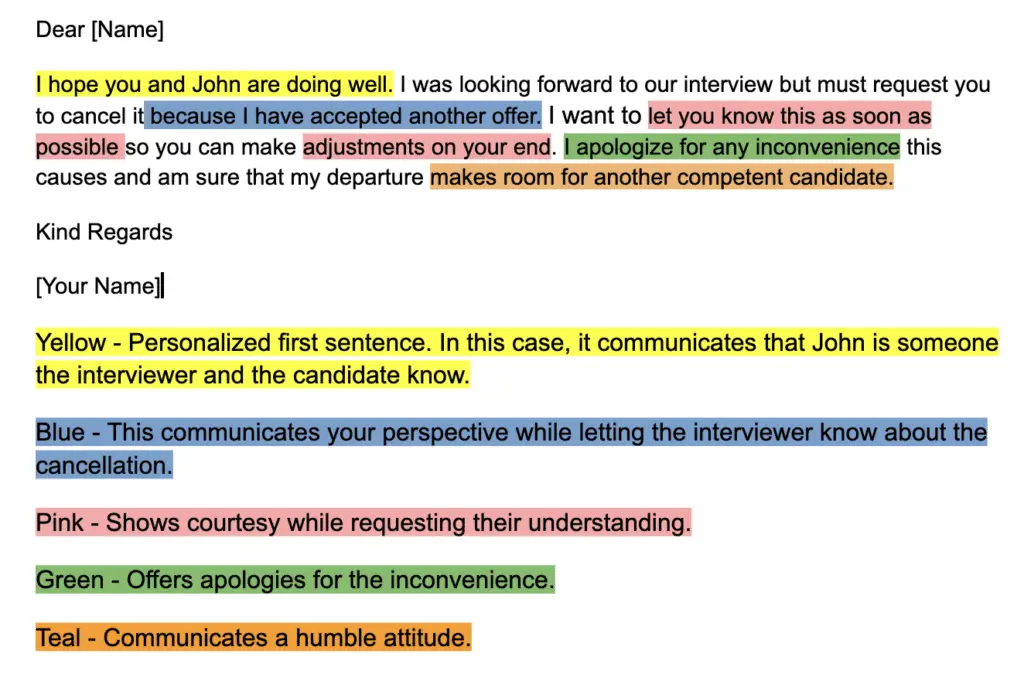This post may contain affiliate links, which means I’ll receive a commission if you purchase through my links, at no extra cost to you. Please read full disclosure for more information.
Accepting a job offer that accurately reflects your experience and marketplace value is a great feeling, as it erases all worries about looking for a job. The only worry that remains is that of disappointing other interviewers you have agreed to meet. But it’s perfectly acceptable to cancel an interview because you got a job.
To cancel a job interview after accepting another offer, you should send an email reply as soon as you can and inform the scheduler that you have to cancel the appointment because you have joined another company. You should also apologize for any inconvenience and wish them the best.
It is easy to come off as condescending or even rude when canceling a job interview, which is why you should understand the nuances of rejecting a pre-set appointment. Aspects like courtesy, conveying your perspective, and showing remorse for their inconvenience can help soften the blow. In this article, you will learn how to cancel a job interview via different media and at different timeframes.
Is It Bad to Cancel a Job Interview?
It is not bad to cancel a job interview, but you have to be tactful about how you cancel. Ghosting the interviewer or canceling in a rude tone can be detrimental to your reputation. You should communicate with courtesy that you’ve accepted another offer to save the interviewer’s time.
The Do’s and Don’ts of Canceling an Interview Due to a Job Offer
Even though canceling a job interview is not inherently bad, there are a few mistakes that can make the cancellation a bad move. Follow these best practices to get the point across without confusing the other party or coming off as rude.
- Do mention the cancellation in the subject line – HR Managers and interviewers have their inboxes flooded with emails. Mentioning the word “cancellation request” or “interview cancellation” ensures that they open the email and get the point immediately.
- Do cancel as soon as possible – Waiting to cancel is a disservice to the other party as they miss out on considering other candidates and sending out interview invites to fill their recruitment pipeline.
- Do show courtesy – You should apologize for the inconvenience even though the other offer’s timing isn’t dictated by you.
With the best practices of canceling a job interview covered, let’s look at what you should avoid when canceling a job interview:
- Do not make up false excuses – If you’re canceling because of another offer, do not cite health reasons or other issues. This can make the scheduler think you’re still a candidate.
- Do not mention the name of the other company – Sometimes, HR managers can contact the other company and try to get them to redact their offer. This is rare, but it is better to avoid disclosing this information.
- Do not be rude to the company you’re canceling on – HR managers, interviewers, and schedulers all talk. You do not know how your career trajectory will pan out, so it is best not to be rude.
- Do not mention what you disliked about the process – Finally, avoid making the cancellation more complicated than it is. Mention the fact that you’re canceling and that you already have a job. Everything else is irrelevant and not constructive.
How to Cancel a Job Interview After Accepting Another Job Offer
To cancel a job interview after accepting another offer, you must act as soon as you can so the company does not pass on other promising candidates. You should be humble in your communication and assume that this makes room for the interviewing company to find someone that’s a better fit for them.
Your cancellation serves only one purpose: to let the interviewer know that there’s one less person in her candidate pool. She can then go back to the shortlist and invite another individual. For your cancellation to have this effect, you must cancel at least one week before the interview. If you have no option because you accepted the offer too close to the interview, connect with the interviewing company right away.
Cancellation helps the company adjust, but if you do not use the right approach, you might unintentionally hurt the person on the receiving end. It might be tempting to adopt a subtle “I am better off” attitude.
But before your email implies, “I don’t need you,” you must consider that every industry is a small world, and people know people. As long as you can communicate that you won’t show up without the interviewer inferring that she missed out, the cancellation will have the desired positive effect.
How to Cancel Your Interview Through Email
To cancel your interview through email, you must write a personalized first sentence and use a template that offers apologies for cancellation, communicates your perspective, and asserts that your departure from the candidate pool makes room for other competent individuals.
The following template encompasses the points above, with each aspect highlighted in a different color so you can change the wording and communicate the key points in the desired order.

Make It Your Own
You can change the personalized sentence in the yellow space, communicate your side in your own words within the blue area, be courteous in your statement in the pink section, and offer your apologies in the green. Do not forget to be humble and communicate your confidence in them finding an excellent candidate by the end (teal section).
How to Cancel an Interview Last-Minute
Canceling the interview at least one week before puts you in an ethically neutral position. In fact, it makes your email a matter of courtesy. But if you accept an offer last minute, then your cancellation is a disservice to the interviewing company. Still, you cannot reject offers just so you can finish your job interview circuit. If you have to cancel last minute, you have to do so with tact.
To cancel an interview last minute, you must sandwich it in an opening and closing apology and give context as to why the cancellation is happening at the last minute. Ask yourself what kind of email would make you understand someone canceling on you, and pen that email for the interviewer.
You must be respectful and should create a context where communicating disappointment doesn’t serve a purpose. When you communicate that you already know how the cancellation inconveniences the interviewer, she doesn’t have to email you stating how many issues it is causing. The example below covers how you can cancel last minute with tact.
Last-Minute Interview Cancellation Templates
Template 1
Dear [Name],
I would like to apologize for having to cancel our upcoming interview because I have accepted another offer. I know that this is pretty close to the interview date, but the offer came in today. I wasted no time in letting you know and hope you can make adjustments. Again, I apologize for making this a last-minute cancellation.
Regards,
Your name.
Template 2
Dear [Name]
I am sorry for having to cancel last minute, but because I’ve accepted another job offer, honoring the interview commitment would waste your valuable time. To make sure you can adjust things on your end, I am writing this email right after accepting an alternative offer.
I am positive that this gap will be filled by a competent candidate as [the recipient’s company name] is a respected organization that attracts top talent. Once again, I apologize for the inconvenience this causes.
Regards,
[Your name]
Interview Cancellation Template for One Week Before the Date
Dear [Name]
I would like to cancel the interview appointment we have because I have accepted a job offer elsewhere. I want to inform you that there is time to expand your shortlist. Above all, I hope you find the best candidate for the job.
Regards,
[Your name]
Final Thoughts
Canceling a job interview can be uncomfortable, especially if you’re conflict-averse. But if you focus on the fact that you’re minimizing problems for the other party by being honest, you can get over the fear of rejecting an interview after agreeing to an appointment.
Being courteous is always important, and making sure the other party understands why you are no longer a candidate can help preserve your reputation.



